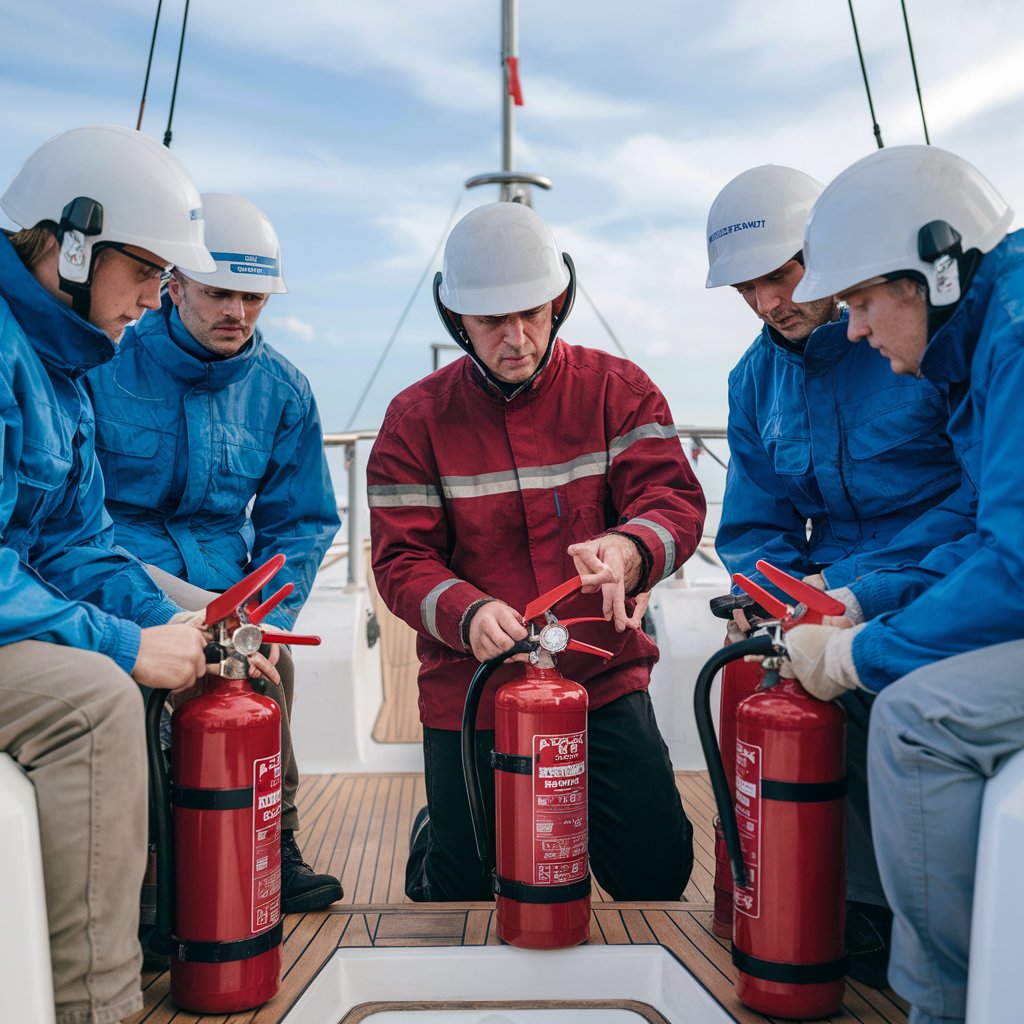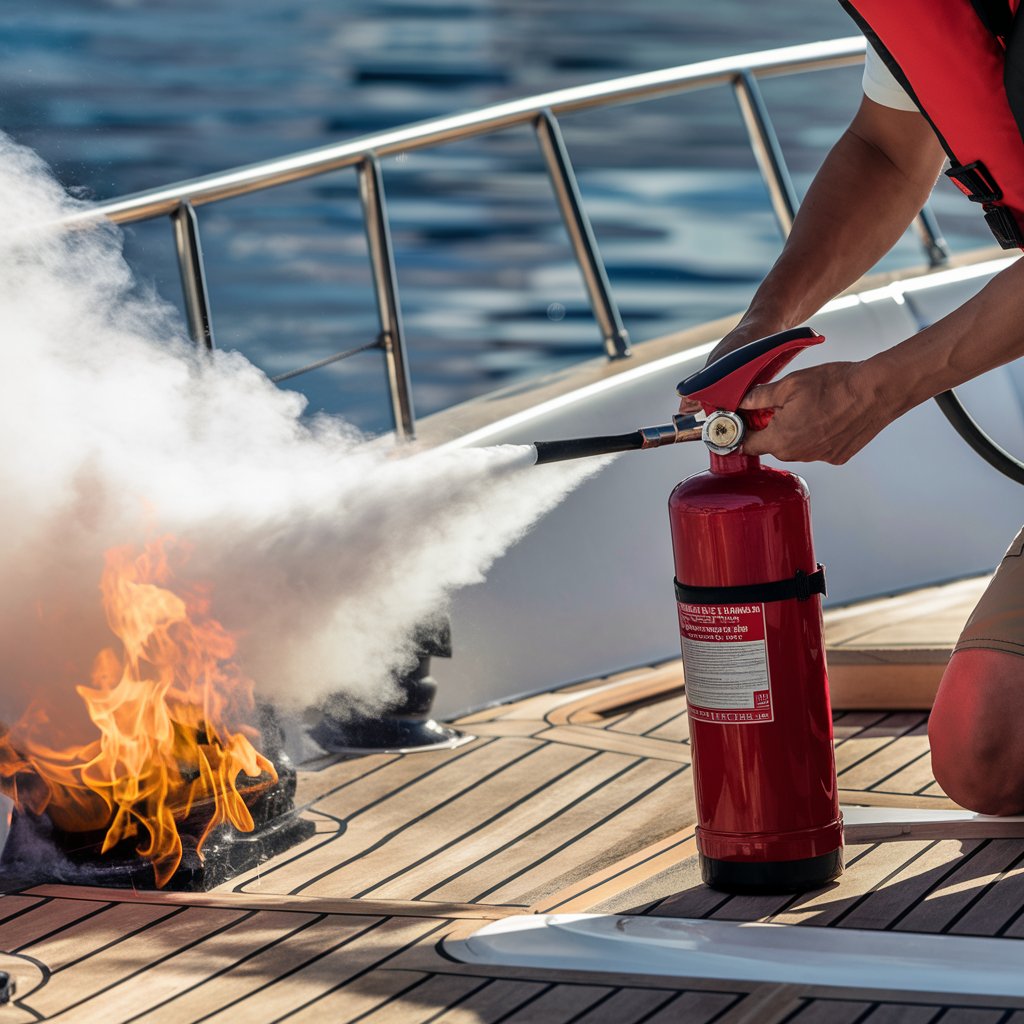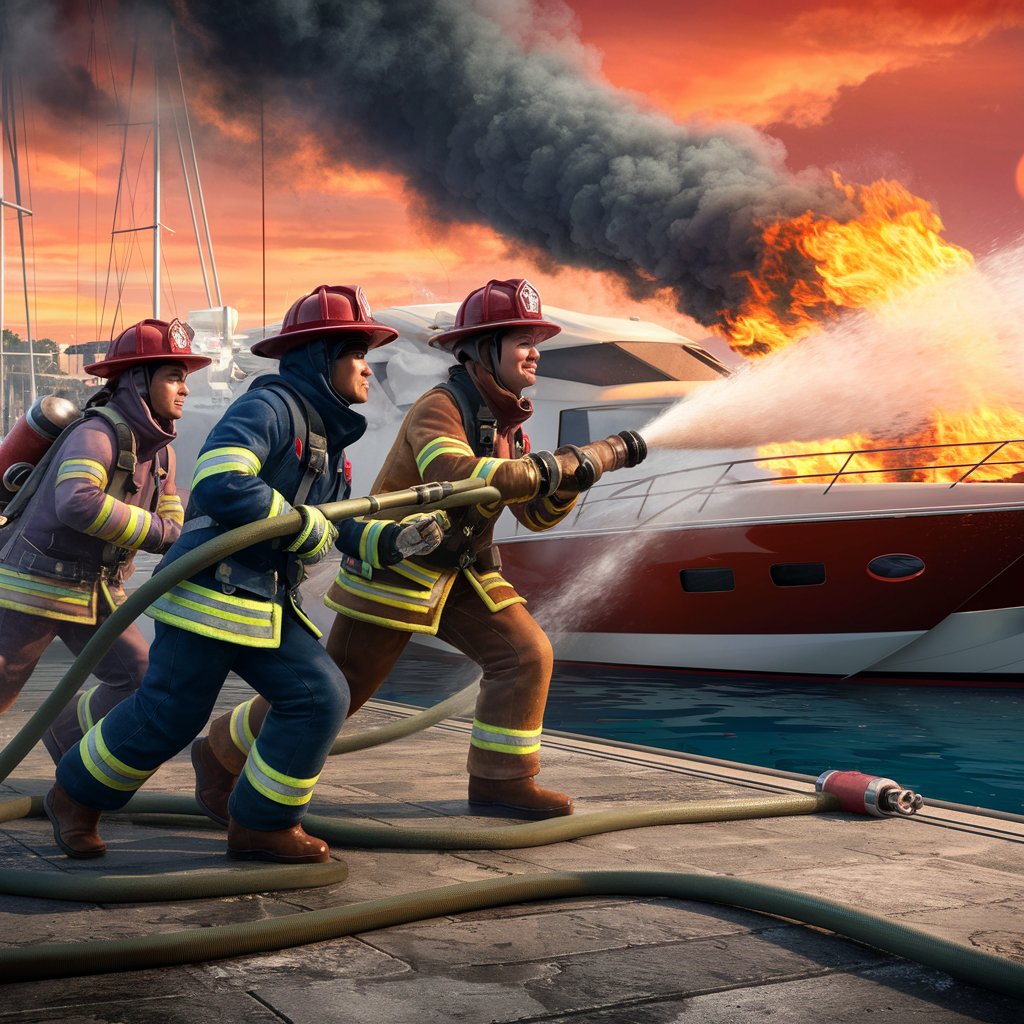Yacht fires are no joke, posing serious risks both at sea and in the Marina. Knowing how to prevent these fires can often mean the difference between a minor hiccup and a full-blown disaster. It’s crucial to recognize common causes and take proactive steps to mitigate these risks.
Many yacht fires start with electrical issues. These can stem from outdated wiring, overloading circuits, or even faulty appliances. Regular inspections and upgrades go a long way in preventing these types of fires. Also, always ensure your electrical systems are up to code and handled by qualified professionals.
Fuel leaks are another major concern. Leaks can happen anywhere in the system—from the fuel tanks to the lines that run to the engines. Regularly checking for and fixing leaks can prevent fires. It’s wise to have fuel lines inspected at least once a year and replace anything that seems worn or damaged.

Engine overheating is a big deal too. Engines that aren’t properly maintained can overheat and catch fire. Engineers on yachts do well to keep up with regular engine maintenance, including oil changes and coolant checks. Monitor the engine temperature gauges to catch any issues early.
Cooking accidents are surprisingly common. Never leave the galley unattended while cooking, and make sure you have a fire extinguisher nearby. Use flame-retardant materials for your galley setup and keep combustibles away from open flames or heating elements.

A Recent Rise in Yacht Fires
We have seen a steady increase of incidence of yacht fires in recent months. These occurrences can be attributed to several factors related to the complexity and demands of modern yachting. Today’s yachts are equipped with sophisticated electrical systems, advanced fuel mechanisms, and a plethora of high-tech gadgets and amenities designed for luxury and comfort.
This complexity increases the likelihood of electrical malfunctions and fuel leaks, both of which are common fire hazards. Additionally, the trend towards more powerful engines and the integration of multiple electronic devices further elevates the risk. Human error also plays a significant role, as improper maintenance, careless handling of flammable materials, and a lack of regular safety inspections can easily lead to fire outbreaks.
Added to that the sheer number of yachts in operation today, often moored in crowded marinas where fires can quickly spread from one vessel to another, exacerbates the problem. The combination of these elements creates a perfect storm, making yacht fires more frequent and highlighting the critical need for stringent safety measures and regular maintenance practices.

Transform your Home or yacht’s comfort with Latex for Less mattresses! Crafted with natural latex, our mattresses provide luxurious support and a restful night’s sleep. Experience unmatched quality and eco-friendly design, perfect for enhancing your interior. Click HERE and Discover the Latex for Less difference today!

Human error can’t be overlooked. Mistakes can pop up at any time leading to serious accidents. Always follow best practices and guidelines when handling anything that could potentially ignite. Education and Training for everyone on board can make a huge difference.
Learning from past incidents gives valuable insights into fire safety. Take the luxury yacht Kanga, which caught fire off Croatia in 2019. Everyone was evacuated safely, but the yacht suffered significant damage. Then, there’s the superyacht Andiamo that burned in Fort Lauderdale, causing extensive damage. Lastly, in 2020, the Lady MM was destroyed by fire near Sardinia. These cases show how quickly fires can spread and highlight the need for effective fire safety protocols.


What Should You Do Immediately if the Boat Catches Fire?
If you find yourself facing a fire on your yacht, the first and most crucial step is to remain calm and act quickly. The initial moments are critical in containing the fire and ensuring the safety of everyone on board. Immediately raise the alarm to alert all passengers and Crew Members, ensuring that everyone is aware of the situation. Activate the yacht’s fire alarm system if equipped, to provide an auditory warning. Quickly assess the fire to determine its source and size, focusing on whether it can be managed with an onboard fire extinguisher.
If the fire is small and contained, such as a localized electrical fire or a minor galley blaze, use the appropriate type of fire extinguisher to attempt to extinguish it. Remember the PASS technique: Pull the pin, Aim the nozzle at the base of the fire, Squeeze the handle, and Sweep from side to side. Concurrently, take immediate steps to prevent the fire from escalating. Shut down all electrical and fuel systems to eliminate potential sources of ignition and fuel that could exacerbate the fire. This may involve turning off the yacht’s main electrical breaker and closing fuel valves.

Ensure all passengers don Life Jackets in case an evacuation becomes necessary. If the fire cannot be contained and starts to spread, follow your yacht’s emergency evacuation plan. Direct everyone to the pre-determined muster stations and proceed to evacuate the yacht in an orderly manner, using lifeboats or life rafts if available. Make sure to broadcast a distress call on the VHF Radio, providing your location and the nature of the emergency to nearby vessels and maritime authorities. Effective and decisive action in these critical moments can significantly increase the chances of a successful outcome and the safety of all onboard.
Using firefighting equipment effectively is crucial. Make sure you have the right types of extinguishers on board, such as Class B extinguishers for fuel fires and Class C for electrical fires. Regular drills and Training ensure everyone knows what to do.
If the fire seems unmanageable, don’t wait to initiate emergency evacuation procedures. Direct all passengers and crew to muster stations or Life Rafts. Have a clear evacuation plan in place and practice it often. Quick and orderly evacuation can prevent injuries and save lives.
A Breakdown of Fire Safety Precautions and Response
Preparation and Prevention
- Regular Maintenance: Ensure all electrical and fuel systems are routinely inspected and maintained by qualified professionals.
- Fire Detection Systems: Install and regularly test smoke detectors, heat sensors, and fire alarms throughout the yacht.
- Fire Extinguishers: Equip the yacht with appropriate fire extinguishers and ensure all crew members are trained in their use.
- Emergency Plan: Develop and practice a comprehensive fire emergency plan, including evacuation routes and communication protocols.
Immediate Response to a Fire
- Raise the Alarm: Notify all passengers and crew members immediately, and activate the yacht’s fire alarm system.
- Assess the Fire: Determine the source and size of the fire. If it is small and contained, use a fire extinguisher to attempt to put it out.
- Shut Down Systems: Turn off electrical and fuel systems to prevent further escalation.
- Evacuate if Necessary: If the fire cannot be controlled, follow the emergency plan to evacuate the yacht. Ensure everyone dons life jackets and follows the designated evacuation routes.
Fire Safety in Marinas
Yacht fires are not confined to open waters; they also occur while the vessel is docked. Marinas pose additional risks due to the close proximity of boats and the presence of various fuels and electrical connections.
Community Preparedness: Foster a culture of safety among yacht owners and marina operators through regular safety drills and shared best practices.
Dock Safety Measures: Maintain safe distances between yachts, enforce strict no-smoking policies, and ensure proper storage of flammable materials.
Marina Fire Systems: Marinas should be equipped with adequate fire detection and suppression systems, and staff should be trained in fire response protocols.
Final Thoughts
Preparation and quick action are vital when dealing with a yacht fire. By understanding potential hazards, maintaining safety equipment, and knowing how to respond, you can significantly reduce the risk and impact of a fire on your vessel. Stay safe and ensure your yacht is always prepared for emergencies.
**Our Website contains affiliate links. This means if you click and make a purchase, we may receive a small commission. Don’t worry, there is no extra cost to you. It’s a simple way you can support our mission to bring you quality content**.
Explore Europe for $842! 7 nights aboard Norwegian Getaway from Athens. FREE At Sea: discounts, dining, open bar & more! Book now. Prices may vary.


The step-by-step breakdown of prevention and emergency response is exactly what anyone with a yacht needs. I especially appreciated the tips on the importance of regular safety checks and having the right fire suppression equipment onboard. I once had a minor scare with a small fire, so I know how crucial it is to be prepared.
Awesome Andy
Many thanks for your feedback. I am happy you thought the article was informative.
Hey there,
This is an incredibly informative and timely guide! As a yacht enthusiast, it’s alarming to think about the risks of fires on board, but it’s crucial to be prepared. The step-by-step instructions and expert advice provided here are invaluable in helping to prevent and respond to yacht fires. A must-read for anyone who spends time on the water!
Marios
Thanks Mario
I am happy that you thought the article was timely and informative, and indeed it is. It also seems like a yacht fire is occurring everyday now!
Thank for this interesting article. This is a topic I know nothing about, and I found the article is detailed and well written. I can see that the detailed breakdown of common causes and practical steps for maintenance and emergency response is useful for yacht owners.
I was wondering if there are any examples of effective safety drills or initiatives that marinas could implement to enhance fire safety?
Take care!
Hello MD
Thank you for your positive feedback! I’m glad you found the article detailed and useful. Regarding your question, marinas can enhance fire safety by implementing regular safety drills, including fire extinguisher training and emergency evacuation procedures. Initiatives like installing fire suppression systems, conducting fire risk assessments, and promoting a “fire warden” program where staff and volunteers are trained to lead during emergencies can also be very effective. Take care!
Hello Troy,
I appreciate your time and effort in putting together this great article.
Your article touched on the observed recent high rate of yacht’s fire incidences.
You did justice in providing a thorough overview of the risks (electrical issues: outdated wiring, overloaded circuits, faulty appliances, fuel leaks, engine overheating, and cooking accidents), preventive measures (check and repair leaks regularly, maintain engines, and monitor temperature gauges), and emergency measures as well, pointing out the importance of vigilance and preparedness.
The article explains further that the recent increase in yacht fires could be traced to the complexity of modern yachts (more complex yachts, sophisticated systems and numerous sensitive electronic devices), as well as human errors, improper maintenance, and crowded marinas.
The emphasis on the need for yacht’s owners and operators to prioritize safety protocols (equip marinas with fire detectors, no smoke policy, maintaining safe distance between yachts, etc.) and regular inspections is commendable.
Your article serves as an important over all guide for ensuring safety both at sea and in marinas.
Thanks for sharing this informative article.
– Makinde
Hey Makinde
Many thanks for your thorough feedback of the article. I am happy you enjoyed and thought it was useful and timely.